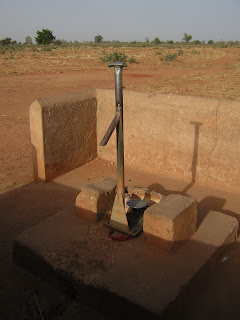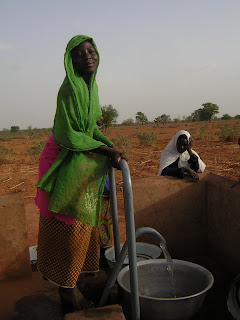As my last entry states, I finally found funding through USAID to repair the broken foot pump in my village. At the end of April, a technician from the Department of Hydraulics came to the village with brand new pump parts and with everyone crowded around, he replaced the broken parts in one afternoon. Within three days, we could get strong streams of clean, clear water out of the pump. A week later, I sent two motivated "gear-head" village men to the regional capital to learn pump maintenance. They spent a week there and even went on a few field trips to take apart and put back together various pumps. They brought back with them a utility chest of saws and wrenches and happily demonstrated the uses to me. Six months later and the pump is still fully operational. A pump fund was created with the founding of the pump committee. The committee members have been holding meetings on their own without my initiative and have been reminding people about paying their dues for using the pump. The families in our community have been excellent about paying to the pump fund once a month. During the rainy season, when most families have very little money – let alone enough food – only eight people paid the pump fund dues. However, now that harvest has started, everyone has repaid their debts in full.


In addition to the successful pump project, I have worked on establishing a primary school in the village. My counterpart and I went to each family concession in the village and also the neighbor village to write down the names of each child whose parents wanted them to enter school. It was a difficult process but we successfully recorded the ages of each child (they had to be between 5 and 8 years old to be included on the list). Incredibly, the majority of students to be enrolled in school are girls. Once this list was complete, my Peace Corps Agriculture supervisor helped me to write a cover letter in French to the Gaya School Board Director. Then he met me in Gaya where I traveled with my village chief to meet with the Director in person. The school year officially started on October 4th. However, most teachers did not begin classes until the 18th, which is when our teacher arrived. At the time, I was at a training session seven hours away. I just finished yesterday and will be returning home today to finally meet our new teacher. The kids were all anxious to start school when I left and I hope they are enjoying this new opportunity. Only one man in my village has ever attended formal schooling and he was not able to continue beyond two years of primary school. Despite this, or perhaps because of this, the villagers are completely supportive and enthusiastic about having a school. For example, we needed to make an enclosed shade hangar for the temporary school and so all the men of the village took time out of harvesting their crops to build it in one day. Now I just hope we have a good teacher and the kids keep up their studies.
One side project I have been doing since August is tutoring my friend Dizey in French. She was chosen as the secretary for the pump committee because she is a motivated young mother and is the only semi-literate woman in the village. About five years ago, the village had an adult Zarma literacy program in place. It has since ended but Dizey was the one woman who attended every class until the end. Yet it has been years since she last practiced reading and writing. We have practiced writing the alphabet in uppercase and lowercase letters and quickly moved on to months and the days of the week in French. She has been so quick to learn French vocabulary and money that we have been able to move on the greetings and grammar. I hope that before I leave she will not only do the bookkeeping for the pump committee with total confidence but even be able to hold a small conversation in French!

One side project I have been doing since August is tutoring my friend Dizey in French. She was chosen as the secretary for the pump committee because she is a motivated young mother and is the only semi-literate woman in the village. About five years ago, the village had an adult Zarma literacy program in place. It has since ended but Dizey was the one woman who attended every class until the end. Yet it has been years since she last practiced reading and writing. We have practiced writing the alphabet in uppercase and lowercase letters and quickly moved on to months and the days of the week in French. She has been so quick to learn French vocabulary and money that we have been able to move on the greetings and grammar. I hope that before I leave she will not only do the bookkeeping for the pump committee with total confidence but even be able to hold a small conversation in French!

Now on to Peace Corps updates: Two weeks ago I came to Niamey for my Close of Service Conference. My Ag/NRM (Agriculture/Natural Resource Management) stage of '08 has two months left in country so we were all required to come to the capital to do paperwork and to learn about how to get a job in the States (you know, among other important reintegration tips). But after this conference, the prospect of assimilating back into the US seems more daunting now than ever before. I have not left West Africa since 2008 and I feel completely left behind by America. I have not lived under the Obama Administration and have never seen an iPad. I have been having fantasies about buying apples at the grocery store and panic attacks about choosing breakfast cereal. I am impatient to see my family and friends and to get a decent job but already planning long and complicated road trips to escape a settled life. My Close of Service is like the fast approach of a public speech or a standardized test. It is looming closer every day, scaring me to death, but also making me anxious to get it over with. Thank goodness that most of my villagers now have cell phones. I tell myself every day that I will keep in touch with them and so this is not goodbye or "the end."
As I mentioned earlier, I attended a training this week. It started right after the Close of Service conference. Five of us Ag/NRMs '08 and one MCD (Municipal Community Development) from '09 were asked to become VATs (Volunteer Assistant Trainers) for the incoming FARM/CHA (Forest and Agriculture Resource Management/Community Health Agent) stage. We spent a week with the Nigerien language trainers and Peace Corps staff to prepare for this new group of trainees. They arrived yesterday, October 22, and we went to the airport, accompanied by warm bottled water and a welcome banner. Forty-three of them stepped off the plane, making our group of six look even more tiny. They were fresh faced and enthusiastic despite the 24-hour plane ride. Some of them were even happy with the Niger heat because Paris had been freezing and the airplane ride was just as cold. I will be their VAT in November and can't wait to get to know them. I'm glad I decided in the end to become a VAT. I had heavy reservations about taking on the job and sacrificing my precious time in village. But Peace Corps Niger needs all the support and enthusiasm that it can get right now. I feel proud to help and I think it will assist me to close my service without regret and as a more rounded volunteer.

Till Next Time!

